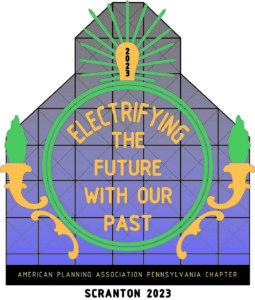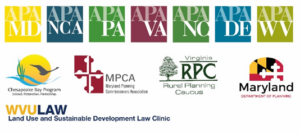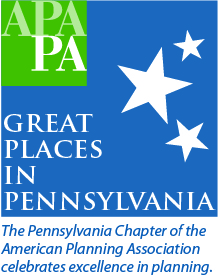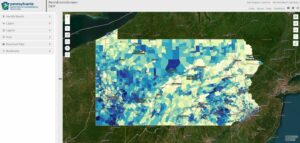The Latest News from PA Chapter of APA…
We live in an era when storms and other natural disasters have become much more intense, adversely affecting our communities, businesses, homes, and natural environment. Planning for these problems is simply part of what planners now do. This month, we highlight community and professional resiliency, hazard mitigation and disaster recovery planning, and environmental justice tools for making sure your hazard mitigation planning is meeting the needs of all residents, including those in disadvantaged communities. Enjoy!
Register for Annual Conference!
 This year’s conference, Electrifying The Future With Our Past, will be held at Hilton Scranton and Conference Center October 15-17, 2023. A reception will be held at the historic Scranton Cultural Center at the Masonic Temple on Sunday evening. A planner’s social will be held on Monday evening at the Bourbon Bar in the Hilton, followed by a self-guided tour of locations from The Office!
This year’s conference, Electrifying The Future With Our Past, will be held at Hilton Scranton and Conference Center October 15-17, 2023. A reception will be held at the historic Scranton Cultural Center at the Masonic Temple on Sunday evening. A planner’s social will be held on Monday evening at the Bourbon Bar in the Hilton, followed by a self-guided tour of locations from The Office!
The last day to register for the conference is October 6. There will be no onsite registration.
This year’s conference also includes:
- Over 45 classroom sessions
- Opening Session with Maria MacDonald
- State of the Chapter Address
- Annual Awards
- Tuesday Plenary with John Kamp and James Rojas with Place It!
- Pitkin Lecture with Anthony Flint
- 6 Mobile workshops: including two recent Great Place Award Winners- Downtown Pittston and McDade Park
- Sustainability/Resilience, Equity, Law and Ethic sessions available
- and so much!
A HUGE THANK YOU to our sponsors, exhibitors and advertisers for supporting the annual conference!
 Mid-Atlantic Planning Collaboration Webinar: Off the Shelf and Into Action, How to Create an Implementable Comprehensive Plan
Mid-Atlantic Planning Collaboration Webinar: Off the Shelf and Into Action, How to Create an Implementable Comprehensive Plan
Thursday, October 5 from 12:00 PM – 1:00 PM
The PA Chapter of APA will be hosting this upcoming FREE webinar as a part of the Mid-Atlantic Planning Collaboration webinar series. Denny Puko and Jim Pashek will present an encore presentation of their webinar entitled “Off the Shelf and Into Action, How to Create an Implementable Comprehensive Plan”. The webinar will discuss the “implementable comprehensive plan” approach – principles and steps communities can employ to create plans elected officials and citizens embrace and partners join in to help implement. The webinar will highlight case studies and lessons learned as the implementable plan has grown as a movement in Pennsylvania. Presenters Denny and Jim are pioneers of the implementable plan approach. Ideas they will present come from their book Off the Shelf and Into Action, How to Create an Implementable Comprehensive Plan. Please register to attend this FREE webinar online.
Planning Webcast Series
Earn over 50 CM credits each year online – at no cost to members of participating organizations that support the Planning Webcast Series. Webcasts take place live on Fridays from 1:00 – 2:30 PM ET and are worth 1.5 CM credits (for live viewing only) unless otherwise noted. More information online.
For APA members that need CM credit for on-demand education sessions are available. The Planning Webcast Series, sponsored by APA Chapters & Divisions, are offering credit till the end of the year (12/31/2023). More information online.
PMPEI
The Pennsylvania Municipal Planning Education Institute (PMPEI) courses are here for you if you are a local planning commissioner, zoning board member, zoning administrator, elected official or municipal planning staff. PMPEI, established in 1992, is the Chapter’s primary outreach to the planning community and is a collaboration between the PA Chapter of the American Planning Association (PA/APA) and the PA State Association of Boroughs (PSAB). PMPEI offers four, 10-hour in-depth courses, and four 90-minute online courses dealing with the Municipalities Planning Code and Community Planning, Zoning and Zoning Administration, and Subdivision and Land Development Review. Classes are kept small, are within reasonable distances, low cost, team-taught by experienced instructors, and include lots of hands-on instruction. Course listings and descriptions may be viewed at PMPEI’s website, pmpei.org. Contact Terri Dickow at tdickow@boroughs.org (or 1-800-232-7722 ext 1042) to find out how you can be part of the Chapter’s planning education outreach!
- Train the Trainer-CANCELLED
The PA Municipal Planning Education Institute will be conducting a Train-the-Trainer class to prepare instructors to teach the PMPEI Course in Subdivision and Land Development Review. The training consists of two weekend sessions, Friday and Saturday, October 6 and 7, and Saturday, October 21. and will be held in State College.
Communication and Membership Committee
The Communication and Membership Committee is working with Bull Moose Marketing to complete a Communication Plan for the Chapter. Please take a moment to complete the online survey.
The Communication and Membership Committee is looking for volunteers to contribute articles for our monthly E-News. If you are interested or would like more information, please contact Amy Evans or Amy McKinney.
Opportunities for Giving
Each year the Chapter offers a scholarship to support individuals seeking funds for academic degree programs, internships, and professional development activities. If anyone would like to contribute to the Chapter’s Scholarship fund, donations can be made here. We accept all major credit cards, or you can send a check. Please make your check payable to “PA Chapter of APA Scholarship Fund” and mail it to P.O. Box 4680, Harrisburg PA 17111.
FEMA Region 3 Coffee Breaks Webinar Series
FEMA Region 3 hosts a webinar series for anyone who wants to reduce risk in their community. These hour-long “Coffee Breaks” are held every other month. FEMA staff share mitigation best practices and highlight the work happening at the federal, regional, state and community levels to reduce risk in Region 3. Coffee Break webinars are open to anyone in the hazard mitigation, resiliency, or risk reduction planning fields. This work can be in the public or private sectors. Community planners, emergency and floodplain managers, GIS technicians, government officials, and contractors – or anyone interested – is welcome to attend. You can find more information here.
- Conducting a Risk Assessment
November 8, 2023 from 11:00 AM – 12:00 PM Eastern Time
When creating a hazard mitigation plan, the risk assessment details the hazards that your community faces. Documenting the geographies, populations, and critical facilities at risk will help you identify ways to promote resilience. This webinar will guide you through the risk assessment process.
 Congratulations to the 2023 Great Places in PA!
Congratulations to the 2023 Great Places in PA!
The Pennsylvania Chapter of the American Planning Association is proud to announce the 2023 Great Places in PA, with McDade Park and Pearson Park designated as Great Public Spaces and Downtown Pittston and The Arc Community Greenspace designated as Great Transformations.
Great Places are unique, memorable places that display a wealth of best practices in community planning, serve as a community focal point, and strengthen the local economy. They also demonstrate the rewarding results that occur through planning, partnerships, and community engagement.
2023 marks an important milestone in the Great Places in PA program – 10 Years of designating Great Places throughout the Commonwealth. This has included a mix of Great Greenways/Trails, Neighborhoods, Public Spaces, Streets, and Transformations. There are now 55 designated “Great Places in PA” located in 33 of the Commonwealth’s 67 counties.
Looking to the Future for Community and Professional Resiliency
By Amy Evans, AICP
When planners talk about resiliency, we’re usually considering how well a community can bounce back from a given challenge. Building resiliency in this way usually involves identifying processes, programs, and data that support a community’s ability to prepare for and respond to a disaster or crisis efficiently and effectively.
In this mindset, we sometimes miss opportunities for baked-in resiliency that lay in how we know what to plan for in the future, methodologies that go well beyond 100-year floods, traffic counts, and population projections.
Collectively, these skills foster strategic foresight, or planning with foresight. A recent 2-page PAS Quick Notes document defines strategic foresight as “…making sense of the future, understanding drivers of change that are outside of one’s control, and preparing for what may lead to success or failure in the future.”
 A recent article from APA dives into the skillsets planners need to plan well for the future – as well as remain professionally relevant. In many ways, practicing foresight is visioning in reverse. As author Patrick Sisson notes, where visioning starts with the present and leads to goals for the future, foresight “starts with the future and then reverse engineers what needs to happen today to get the most desirable outcome.”
A recent article from APA dives into the skillsets planners need to plan well for the future – as well as remain professionally relevant. In many ways, practicing foresight is visioning in reverse. As author Patrick Sisson notes, where visioning starts with the present and leads to goals for the future, foresight “starts with the future and then reverse engineers what needs to happen today to get the most desirable outcome.”
Tools for planning with foresight include trend scanning, signal sensing, forecasting, sense making, scenario planning, and backcasting. For an example of what scenario planning can look like in Pennsylvania, check out our May 2022 article on transportation planning in York County in the face of uncertainty. Another great resource is APA’s Trend Universe site, maintained by APA Foresight.
Increasing planners’ capacity for strategic foresight can create agility, boost resiliency, and expand capacity for preparedness within communities – as well as ensure that planning itself is resilient to changing demands on the profession.
Hazard Mitigation and Disaster Recovery Planning
By Brian O’Leary, AICP
Over the past couple of decades, hazard mitigation planning has become a key part of a planner’s suite of duties. Unfortunately, so has disaster recovery planning.
The state is currently updating its 2018 Hazard Mitigation Plan, while also providing guidance to counties on their preparation of hazard mitigation plans.
Even with strong hazard mitigation planning, natural and other disasters will still have a significant impact on local communities. Being prepared for these events is critical, and APA provides excellent guidance to local planners on this topic, including the following resources:
- Overview blog article
- Post Disaster Recovery Guide
- Zoning and Disaster Recovery
DEP and Environmental Justice
By Justin Dula, AICP, CC-P
After years of preparation and collaboration, an updated Department of Environmental Protection (DEP) Environmental Justice Policy is adopted as interim final and available for official public comment from September 16, 2023 until October 29, 2023. The interim final policy moves beyond the public participation in the permitting process – it looks at ways DEP can further environmental justice goals in compliance, enforcement, grantmaking, and other aspects of DEP’s work.
Additionally, this policy offers a statewide PennEnviroScreen tool that can assist planners in assessing environmental burdens and socioeconomic vulnerabilities. The state-of-the-art mapping tool will allow DEP to more accurately identify communities facing environmental justice issues using more than 30 environmental, health, and socioeconomic indicators. There is a PennEnviroScreen methodology document that goes into detail on the tool, targeted toward academics and researchers. Additionally this tool can help planners assess their community demographics and how they compare with the rest of Pennsylvania
DEP will host nine total community public meetings in October to accept verbal public comment. Written public comments are also welcomed via the Department’s online eComment tool or email at ecomment@pa.gov. Read the updated policy, view the public hearing dates, and learn how to comment at the EJ Policy Revision webpage. All pa.gov website pages can be translated into a variety of languages using the “Translate” button at the top right of the website.
This EJ Policy includes changes that DEP has been discussing and devising with stakeholders for years are now assembled in an interim final policy that has nine sections.
- Introduction section, which includes history and background.
- The Definitions section describes key terms used in the policy to help clarify the document for the public, DEP staff, and the regulated community.
- Environmental Justice Criteria describes where the policy applies. This will be done through the PennEnviroScreen tool, described in detail in the Pennsylvania Environmental Justice Mapping and Screening Tool (PennEnviroScreen) Methodology Documentation 2023.
- Proactive Community Engagement section describes how DEP can center on community voices by reaching communities before an environmental crisis or project application comes before the agency for review.
- Enhanced Public Participation Process details this process in terms of which projects are covered and how it is applied in the permitting process.
- Inspections, Compliance, and Enforcement guidance help the policy move beyond public participation in the permitting process and consider how DEP can be prioritized within regulatory limits after permits are approved.
- Community Development and Investments look to ways to financially assist communities facing environmental justice issues.
- Climate Initiatives spells out ways that EJ can be included in the climate action plan and other climate efforts.
- Policy Updates, the final section, specifies that the policy should be reviewed for updates regularly to ensure that the policy continues to address community concerns.
At the request of stakeholders, this policy goes beyond the current policy’s scope of public participation and meetings during the review of permit applications. This policy integrates environmental justice into more of the Department’s functions including climate initiatives, penalties (Inspections, Compliance, and Enforcement), and grantmaking (Community Development and Investments).
Visit the policy revision webpage to review the policy today and learn how to comment.


